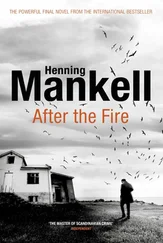Modin looked disbelievingly at him.
“How can you know all that?”
“I just know,” Wallander said. “You were scared and you left. The question I have is why you were so scared.”
“They had traced me.”
“So you weren’t careful enough at erasing your steps? Did you make the same mistake as last time?”
“They’re very good.”
“But so are you.”
Modin shrugged.
“The problem is that you started taking chances, isn’t that so? You copied material from Falk’s computer onto your own, and something happened. The temptation was too great. You kept working on the material through the night, and somehow they caught on to you while you weren’t looking.”
“I don’t know why you keep asking if you already know everything.”
Wallander decided to make his point.
“You have to understand that this is serious.”
“Of course I do. Why would I have tried to get away otherwise? I don’t even have my driver’s license.”
“Then we see eye to eye on this. You realize you’re involved in a dangerous business. From now on you need to do as I say. By the way, has anyone brought you any food?” he asked. “I know you have unusual food preferences.”
“A tofu pie would be nice,” Modin answered. “And some carrot juice.”
Wallander called Irene.
“Could you get us a tofu pie and a carrot juice, please.”
“Can you repeat that?”
Ebba would not have asked any questions, Wallander thought.
“Tofu pie.”
“What on God’s earth is that?”
“Food. It’s vegetarian. Please try to get it as quickly as you can.”
He hung up before Irene had a chance to ask anything else.
“Let’s start by talking about what you saw from your window,” Wallander said. “At some point you discovered a car out there.”
“There are never any cars on that road.”
“You took out your binoculars and took a closer look.”
“You already know everything I did.”
“No,” Wallander said. “I know part of it. What did you see?”
“A dark-blue car.”
“Was it a Mercedes?”
“I don’t know anything about cars.”
“Was it big? Did it look like a van?”
“Yes.”
“And there was someone standing next to the car?”
“That was what scared me. When I looked through the binoculars I saw a man who was looking at me with some binoculars of his own.”
“Could you see his face?”
“I was scared.”
“I know. What about his face?”
“He had dark hair.”
“What was he wearing?”
“A dark raincoat. I think.”
“Did you see anything else? Had you ever seen him before?”
“No. And I didn’t notice anything else.”
“You left. Could you tell if he followed you?”
“I don’t think he did. There’s a little road you can take just a little bit past our house. I don’t think he saw it.”
“Then what did you do?”
“I had sent you the e-mail, but I didn’t feel I could go to Runnerström Square. I didn’t know what to do. At first I was planning to go to Copenhagen. But I didn’t feel up to driving down to Malmö. I’m not a very good driver. Something could have happened.”
“So you simply drove into Ystad. What did you do then?”
“Nothing.”
“You stayed in the car until some policemen found you?”
“Yes.”
Wallander tried to think about where they should go from here. He wanted Martinsson to be present, as well as Alfredsson. He got up and left the room. Irene was at her desk. She shook her head when she saw him.
“How is the food coming?” he asked sternly.
“Sometimes I think all of you are nuts.”
“That’s probably true, but I have a boy back there who doesn’t eat hamburgers. I guess there are people like that. And he needs food.”
“I called Ebba,” Irene said. “She said she would take care of it.”
That put him in a better mood. If she had talked to Ebba, everything would be taken care of.
“I’d like to speak to Martinsson and Alfredsson as soon as possible,” he said. “Please get hold of them as soon as you can.”
At that moment Lisa Holgersson hurried in through the front doors.
“More shooting?” she asked. “That’s what I heard. What happened?”
Talking to Holgersson right now was the last thing he wanted, but Wallander knew he had no choice. He briefly filled her in on the latest events.
“Have you sent out an alert to the neighboring districts?”
“It’s been taken care of.”
“When can we have a meeting about this?”
“As soon as everyone comes back in.”
“It feels to me like this investigation is getting out of hand.”
“We’re not quite at that point,” Wallander said, and he didn’t bother to hide his irritation. “But feel free to relieve me of my responsibilities if you like. Hansson is the one who’s been in charge of the search operation.”
She had a few more questions, but Wallander had already turned his back and started walking away.
Martinsson and Alfredsson came in at five o’clock. Wallander and Modin met with them in one of the smaller conference rooms. Hansson had called to say there was still no trace of the man in the fog. No one knew exactly where Höglund was. Wallander barricaded the door to make sure no one could interrupt them. Modin’s computers were up and running.
“We’re going to go through everything from the beginning,” Wallander said when everyone had sat down.
“I’m not sure we can do that yet,” Alfredsson said. “There are too many things we can’t see clearly yet.”
Wallander turned to Modin.
“You said you had thought of something new,” he said.
“It’s hard to explain,” Modin said. “And I’m very hungry.”
Wallander felt irritated with him for the first time. Modin might be a computer whiz, but he was far from satisfactory in other respects.
“The food is on its way,” Wallander said. “If you need something right now we have good old Swedish rusks, and some leftover pizza. Take your pick.”
Modin got up and sat down in front of his computers. The others gathered behind him.
“It took me a while to figure all this out,” he began. “At first I was convinced that the number twenty that kept turning up had something to do with the year 2000. We already know that Y2K will cause a number of problems in many computer systems. But I never found the missing zeroes, and I also noticed that the countdown, whatever it’s for, looked like it was set to go off much sooner than the end of the year. So I concluded that it had to do with the twentieth of October instead.”
Alfredsson shook his head and looked like he wanted to protest, but Wallander held him back.
“Go on.”
“I started looking for the other pieces of the puzzle. We know something here proceeds from the left to the right. There is an end point, and that’s how we deduce that something is going to happen. But we don’t know what. I decided to surf the Web for information about the financial institutions we had already identified. The National Bank of Indonesia, the World Bank, the stockbroker in Seoul. I tried to see if they had anything in common — the point you’re always searching for.”
“What point would that be?”
“The point of weakness. The one spot where someone could enter the system without anyone noticing.”
“But there’s a lot of awareness about hackers these days,” Martinsson said. “And the business world is getting faster at responding to computer viruses when they emerge.”
“The United States already has the capacity to conduct computer wars,” Alfredsson said. “Earlier, the talk was about computer-programmed missiles, or ‘smart’ bombs. But soon that will be as antiquated as a cavalry. Now the goal is to dismantle the enemy’s networks and kill their missiles. Or better yet, to direct the enemy’s missiles against themselves.”
Читать дальше












